
The ovary is an organ found in the female reproductive system that produces an ovum. When released, this travels down the fallopian tube into the uterus, where it may become fertilised by a sperm. There is an ovary found on the left and right sides of the body. The ovaries also secrete hormones that play a role in the menstrual cycle and fertility. The ovary progresses through many stages beginning in the prenatal period through menopause. It is also an endocrine gland because of the various hormones that it secretes.

A teratoma is a tumor made up of several different types of tissue, such as hair, muscle, or bone. They typically form in the ovaries, testicles, or tailbone and less commonly in other areas. Symptoms may be minimal if the tumor is small. A testicular teratoma may present as a painless lump. Complications may include ovarian torsion, testicular torsion, or hydrops fetalis.
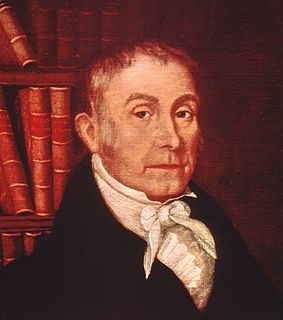
Ephraim McDowell was an American physician and pioneer surgeon. The first person to successfully remove an ovarian tumor, he has been called "the father of ovariotomy" as well as founding father of abdominal surgery.

CA-125 also known as mucin 16 or MUC16 is a protein that in humans is encoded by the MUC16 gene. MUC16 is a member of the mucin family glycoproteins. CA-125 has found application as a tumor marker or biomarker that may be elevated in the blood of some patients with specific types of cancers, or other conditions that are benign.

A germ-cell tumor (GCT) is a neoplasm derived from germ cells. Germ-cell tumors can be cancerous or benign. Germ cells normally occur inside the gonads. GCTs that originate outside the gonads may be birth defects resulting from errors during development of the embryo.
Norton Healthcare is one of Kentucky's health care systems with more than 40 clinics and hospitals in and around Louisville, Kentucky. The hospital and health care system is the Louisville area's third largest private employer, providing care at more than 140 locations throughout Greater Louisville and Southern Indiana. The Louisville-based not-for-profit system includes five Louisville hospitals with 1,837 licensed beds; seven outpatient centers; 12 Norton Immediate Care Centers; over 13,000 employees; some 654 employed medical providers; and approximately 2,000 total physicians on its medical staff.
The Duke University School of Medicine along with the Duke University School of Nursing and Duke University Health System create Duke Health. Established in 1925 by James B. Duke, the School of Medicine has earned its reputation as an integral part of one of the world's foremost patient care and biomedical research institutions.
Abella, often known as Abella of Salerno or Abella of Castellomata, was a physician in the mid fourteenth century. Abella studied and taught at the Salerno School of Medicine. Abella is believed to have been born around 1380, but the exact time of her birth and death is unclear. Abella lectured on standard medical practices, bile, and women’s health and nature at the medical school in Salerno. Abella, along with Rebecca de Guarna, specialized in the area of embryology. She published two treatises: De atrabile and De natura seminis humani, neither of which survive today. In Salvatore De Renzi's nineteenth-century study of the Salerno School of Medicine, Abella is one of four women mentioned who were known to practice medicine, lecture on medicine, and wrote treatises. These attributes placed Abella into a group of women known as the Mulieres Salernitanae, or women of Salerno
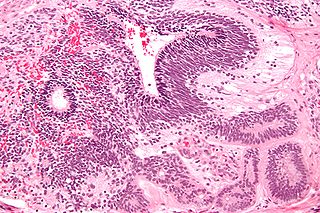
A teratoma is a tumor of germ cell origin, containing tissues from more than one germ cell line. It can be ovarian or testicular in its origin.

A Corpus luteum cyst is a type of ovarian cyst which may rupture about the time of menstruation, and take up to three months to disappear entirely. A corpus luteum cyst rarely occurs in women over the age of 50, because eggs are no longer being released after menopause. Corpus luteum cysts may contain blood and other fluids. The physical shape of a corpus luteum cyst may appear as an enlargement of the ovary itself, rather than a distinct mass -like growth on the surface of the ovary.
Ovarian pregnancy refers to an ectopic pregnancy that is located in the ovary. Typically the egg cell is not released or picked up at ovulation, but fertilized within the ovary where the pregnancy implants. Such a pregnancy usually does not proceed past the first four weeks of pregnancy. An untreated ovarian pregnancy causes potentially fatal intra-abdominal bleeding and thus may become a medical emergency.

Dr. Walter Schiller was an austrian-born American pathologist. He published primarily in the field of gynaecological cancer, and described Schiller's test and Schiller-Duval bodies.
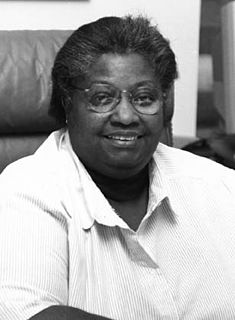
Alexa Irene Canady is a retired American medical doctor specializing in neurosurgery. She was born in Lansing, Michigan and earned both her bachelors and medical degree from the University of Michigan. After completing her residency at the University of Minnesota in 1981, she became the first black person to become a neurosurgeon. This came after the first American woman was board certified in Neurosurgery in 1960. Canady specialized in pediatric neurosurgery and was the chief of neurosurgery at the Children's Hospital in Michigan from 1987 until her partial retirement in 2001. In addition to surgery she also conducted research and was a professor of neurosurgery at Wayne State University. After her retirement, she moved to Florida and maintained part-time practice at Pensacola's Sacred Heart Hospital until her full retirement in January 2012. In 1989, Canady was inducted into the Michigan Women's Hall of Fame, and in 1993 she also received the American Medical Women's Association President's Award. Dr. Canady was known amongst her peers as a patient-focused surgeon who cared deeply about each of her patients.

The Woman's Medical College of Pennsylvania (WMCP) was founded in 1850, and was the second medical institution in the world established to train women in medicine to earn the M.D. degree. The New England Female Medical College had been established two years earlier in 1848. Originally called the Female Medical College of Pennsylvania, the college changed its name in 1867 to Woman's Medical College of Pennsylvania in 1867. The associated Woman's Hospital of Philadelphia was founded in 1861. Upon deciding to admit men in 1970, the college was renamed as the Medical College of Pennsylvania (MCP).
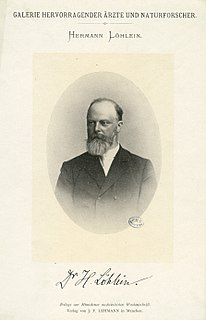
Christian Adolf Hermann Löhlein was a German obstetrician and gynecologist.
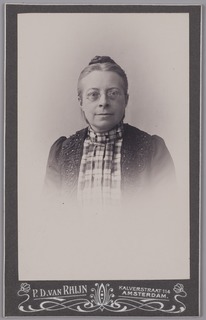
Catharine van Tussenbroek was a Dutch physician and feminist. She was the second woman to qualify as a physician in the Netherlands and the first physician to confirm evidence of the ovarian type of ectopic pregnancy. A foundation that administers research grants was set up in her name to continue her legacy of empowering women.
Louise Southgate was one of the first women physicians in Northern Kentucky where she advocated for girls in the juvenile court system and was an early proponent of birth control. Besides her medical practice and outreach, she led many efforts for the American women's suffrage movement through her local clubs and the Kentucky Equal Rights Association.
















